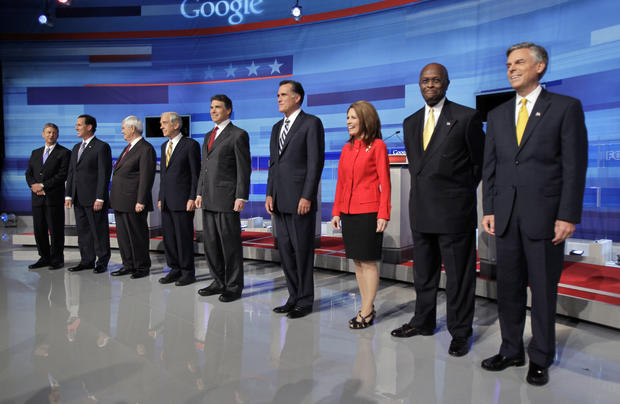Will Republican candidates have to pay the millionaire's tax?
In arguing for higher taxes on the wealthy, President Obama likes to say that it's people like him who can afford to pay a little bit more. Turns out, he's talking about several of the Republican contenders for his job as well.
In a speech earlier this week, Obama floated the idea of a "Buffett Rule," named for billionaire investor Warren Buffett, which would create a minimum tax rate for individuals making more than $1 million a year. Though the White House has yet to announce a formal plan, a National Journal analysis of the financial disclosure filings of seven of the top Republican candidates show that at least half stand to be hit by the kind of tax the president is proposing.
Former Massachusetts Gov. Mitt Romney and businessman Herman Cain both reported a minimum income of more than $1 million in 2010. (Candidates are required to report only ranges of income, not exact numbers.) Romney earned between $9.6 million and $43.2 million from a variety of sources: a diversified portfolio of stocks and bonds, profits from his book, No Apology: The Case for American Greatness, and speaking fees. He also earned tens of thousands of dollars from Bain Capital, the private equity firm he co-founded in the mid-1980s.
"I think the important point here is that Gov. Romney has put out his own plan targeted to providing relief for the middle class," said Andrea Saul, a spokesman for Romney. "As president, Gov. Romney will hold the line on individual income tax rates and eliminate taxes on interest, dividends, and capital gains for low- and middle-income taxpayers."
Cain, who made his fortune in part as the owner of the Godfather's Pizza chain, reported earning between roughly $1.2 million to $3 million in 2010 in salary from Cox Radio, various board director fees, and a diverse stock portfolio, including a large profit from the sale of about 8,000 shares of Coca-Cola Company stock. He got almost $54,000 from the pizza company in 2010.
Two candidates--former Utah Gov. Jon Huntsman and Texas Rep. Ron Paul--may or may not be hit by a millionaire's tax. Huntsman's estimated $689,000 to $5.5 million last year came mainly from shares in the Huntsman Family Holdings Company, various bonds and his equity portfolio. Paul earned an estimated $401,000 to $1.4 million in 2010 in large part from various gold and mining corporations, fitting for a candidate who has called for a return to the gold standard as part of his campaign platform. Paul earned $174,000 in salary as a member of Congress.
Three candidates almost certainly would not be hit by any sort of millionaire's tax rate based on their 2010 income. Rep. Michele Bachmann of Minnesota reported income of an estimated $187,000 to $217,000 that year, according to her congressional financial disclosure statement, principally from her salary as a House member and the Bachmann family psychotherapy business and a stake in a family farm run by her in-laws. Former House Speaker Newt Gingrich earned between $91,000 and $236,000 from various sources, including a rental property in Wisconsin, money from a few foundations, and numerous stocks and investment funds.
Texas Gov. Rick Perry rounds out the trio with an estimated $156,000 to $235,000 in 2010, almost entirely from his $150,000 salary as governor, according to Texas public disclosure filings. He also reported between $10,000 and $24,999 in interest income from dividends, royalties and rent. Perry earned, as well as lost, a few thousand dollars in stocks.
Perry, Bachmann, and former Pennsylvanian Sen. Rick Santorum all have extensions on their presidential candidate disclosure paperwork.
While the filings offer a broad picture of how the 2012 Republican field might be affected by the proposed tax, they do not provide the kind of specificity necessary to determine actual taxable income. For instance, unlike on their tax forms, candidates are not required to report mortgage deductions and other adjustments that would affect income subject to federal taxation. Additionally, candidates are not required to differentiate among different types of dividends and capital gains, some of which are taxed at a lower rate than income. Moreover, the White House has yet to provide detail about how the tax would be applied.
